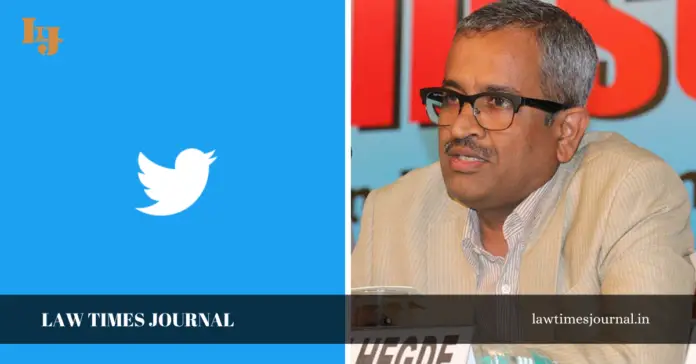
7 November 2019, Senior Advocate Sanjay Hegde sent a legal notice to Twitter Inc over its suspension of his account on the micro-blogging website since 28 October 2019, and its rejection of his appeal against this. Hegde had been active on the social media platform since 2010 and had become a well-known, outspoken public figure with over 98,000 followers. His account was suspended on 26 October in relation to his ‘cover photo’, an image of August Landmesser standing with his arms crossed in the middle of a crowd of people making the Nazi salute in 1936. When Twitter rejected his appeal a couple of days ago, he told The Quint that he was considering legal action.
Facts of the case
The notice was sent by advocate Pranjal Kishore on behalf of Hegde and is also addressed to Union minister Ravi Shankar Prasad, “seeking the intervention of the Ministry in the matter.” Twitter suspended his account twice for allegedly violating its terms of service. The first instance was on 26 October for posting “hateful imagery” when Hegde shared a picture of German worker Augus Landmesser, who is seen refusing to do the Nazi salute at a rally. However, the notice said that Hegde “failed to understand” why Twitter had taken such a step as the post on 27 October was “only quote-tweeted” by him. The notice stated that the tweets did not fall under any of the categories of prohibited posts on the social media platform, which include “violence, abuse/harassment, and hateful conduct.” “It is clear from the above that suspension of my Client’s Twitter account is arbitrary, illegal and Twitter’s own policies. The same is also an infringement to my client’s right to freedom of speech and expression under Article 19 (1) (a) of the Indian Constitution. The Honorable Supreme Court of India has repeatedly held that even private bodies that discharge a public function to the constitution scrutiny,” the notice added.
Hedge also gave Twitter a period of three days from Thursday to comply with the demands, failing which he will initiate legal proceedings, including criminal defamation.
Twitter has been at the target of citizens’ ire after the suspension of Hegde’s account, with activists and journalists accusing the social media giant of conducting its action based on a biased against leaders from marginalised communities.
Many users, including former IAS officer Kannan Gopinathan, who quit the civil service over the Centre’s decision to abrogate Article 370 in Jammu and Kashmir, have advocated switching over to ‘Mastodon’, which is reportedly a free open source platform.
The legal grounds for the notice
At the outset, the notice points out that Twitter has emerged as one of the largest media of communication in the world and “discharges a critical public function – dissemination of and access to information.” It also notes that Hegde and other Twitter members use the platform to directly interact with public representatives and government officials – Prasad’s Ministry of Electronics and Information Technology (MEITY) has even issued guidelines for government departments to engage with citizens on social media platforms. It is then argued that neither of the two tweets by Hegde, which have been cited as the causes of suspension, actually violate Twitter’s rules. The Landmesser photo is a protest against fascism, while the poem he shared (with the phrase ‘Hang Him’, the English translation of its refrain) was a protest against capitalism and the denial of basic rights to the poor.
As a result, the notice argues that it is clear that the suspension of Hegde’s Twitter account is “arbitrary, illegal and contrary to Twitter’s own policies.” The notice to Twitter also references the point made in Hegde’s letter to Prasad, that such a suspension is a violation of his right to freedom of speech and expression, and that the Supreme Court of India has held that private bodies which discharge a public function “are amenable to constitutional scrutiny.”The letter to Prasad expands on this argument in more detail, relying on observations of the Apex Court in its 1995 decision in Secretary, Ministry of Information and Broadcasting vs Cricket Association of Bengal.In this judgment, the Supreme Court had held: “What is, therefore, required, is an interpretation of Article 19(1)(a) which focuses on the idea that restraining the hand of the Government is quite useless in assuring free speech, if a restraint on access is effectively secured by private groups.”
‘We Have Not Issued Any Direction To Suspend The Account’: It Ministry Tells Hc In Sanjay Hegde Vs Twitter Matter
In the High Court of Delhi at New Delhi
(EXTRA ORDINARY WRIT JURISDICTION)
WRIT PETITION (C) No. 13275 of 2019 IN THE MATTER OF :
Sanjay R Hegde… Petitioner
Versus
Ministry of Electronics and Information Technology and Anr…Respondents
The Hon‟ble Supreme Court in its judgment in Anuradha Bhasin v Union of India, 2020 SCCOnline SC 25 has held “that freedom of speech and expression includes the right to disseminate information to as wide a section of the population as is possible.”
The Court has also recognized that “the freedom of speech and expression through the medium of internet is an integral part of Article 19(1)(a)”.
A bare perusal of the two posts that have led to the suspension of the account of the Petitioner go to show that none of these conditions are met. It is submitted that the suspension of the Petitioner’s account is ex-facie illegal. Neither the poem, Unko Phaansi De Do‟ nor the picture of August Landmesser violate any of the Respondent No.2’s terms or the 2011 Rules. The poem by revolutionary Indian poet Gorakh Pandey was written against the first death penalties meted out (to two peasant revolutionaries), in independent India. It is a comment against a capitalist system which denies basic rights to the poor. The photograph of August Landmesser is seen as a symbol of resistance for his refusal to perform the “siegheil” salute before Hitler who was at the shipyard.
Edited by Pragash Boopal
Approved & Published – Sakshi Raje








